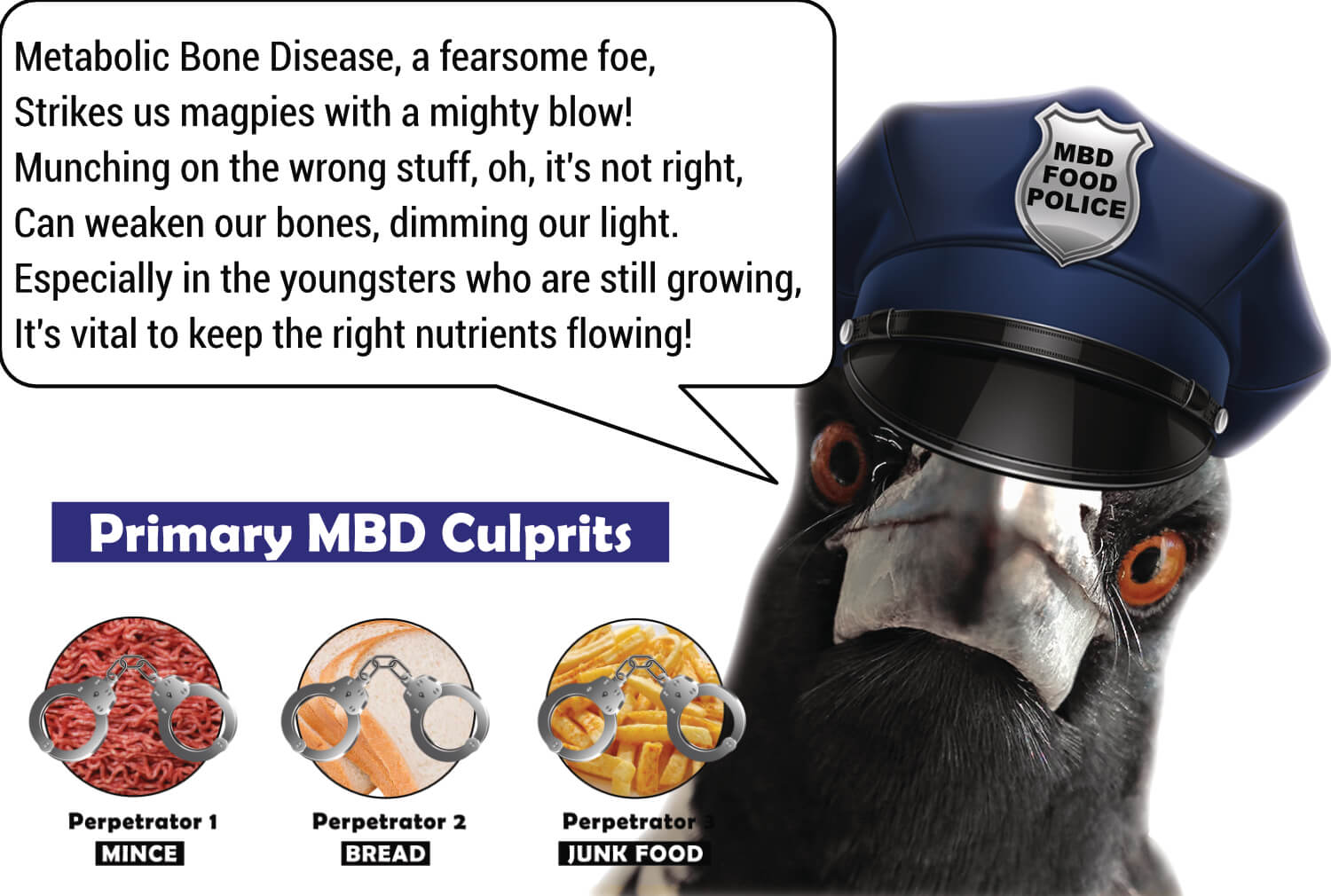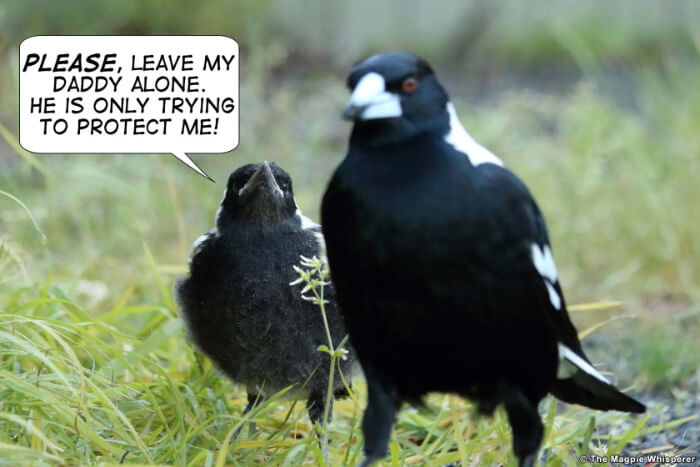Feeding Magpies: Keeping Your Feathered Friends Healthy and Happy
Posted by The Magpie Whisperer on

Feeding wild birds like magpies is a topic that many animal lovers are passionate about, and while it can be controversial, there are ways to do it safely and responsibly.
While we may have good intentions, in certain situations, feeding magpies inappropriate food such as bread and plain mince can actually cause more harm than good. As magpie parents feed their nestlings a great deal of what people feed them, it's crucial that we provide them with the right nutrients to ensure their nestlings grow up strong and healthy, free from debilitating abnormalities like soft or broken beaks, bone abnormalities, deformities, seizures, and poor feather growth.
By taking the time to find the right foods to feed wild birds, we can help ensure that they are healthy, happy, and able to live their lives to the fullest. It may take a little extra effort, but the rewards are well worth it!
Nutrition is Essential
Magpies require a balanced and appropriate diet, just like all living creatures, to maintain their health and wellbeing. For nestlings, in particular, proper nutrition is essential for the development of their beaks, bones, and feathers.
Although some people may argue that magpies can survive on almost anything, it's important to note that improper nutrition can have long-term effects on their health and quality of life. As a licensed wildlife carer who specialises in caring for magpies, I have seen firsthand the detrimental effects of feeding them inappropriate food. In many cases, these effects can be prevented by simply providing the correct nutrients.
Inadequate protein intake can result in poor feather quality, as feathers are mostly made up of keratin, which is a protein. Without enough protein, feathers can become brittle, break easily, and lack the necessary strength to maintain their shape and function properly. Additionally, insufficient protein can lead to reduced growth rates, particularly in young magpies. Proper nutrition is crucial during the early stages of life, as this is when birds are growing rapidly and developing important structures such as their beaks, bones, and feathers. If young magpies do not receive enough protein in their diet, they may not reach their full growth potential, which can have a negative impact on their overall health and wellbeing.
Supplements

If you choose to feed magpies meat, it's crucial to select human-grade meat and supplement it with the appropriate nutrients. Supplements like Wombaroo insectivore mix or Insecta Pro can be purchased from pet stores or online. These supplements are formulated to provide insect-eating birds with the necessary nutrition they need. They are designed to mimic the nutritional content of insects, which are a natural and essential part of the magpie's diet.
It's essential to note that magpies may take some time to become accustomed to the taste of these added supplements. To avoid any negative reactions, it's best to start with small amounts that the magpie won't notice and gradually increase to the recommended dosage. This approach will give your magpies time to adjust to the new taste and texture of the supplement, and help prevent them from rejecting it altogether. To ensure the even distribution of the supplement throughout the food, it's also a good idea to mix it thoroughly with the protein source.
Calcium plays a crucial role in strengthening magpies' bones and beaks. In addition to supplements, sources of calcium such as pulverised eggshells and cuttlefish bone can also be provided.
Steer Clear: Foods to Avoid Feeding Magpies
If you're considering feeding magpies and other wild birds, it's important to keep in mind which foods are not suitable for them. Bread, for example, should be avoided as it lacks essential nutrients and can even cause birth defects in nestlings.
Another food to be cautious about is plain mince, which contains high levels of phosphate that can result in calcium loss from magpies' beaks and bones. Raw meat is also not recommended since it can expose them to parasitic diseases like Toxoplasma gondii, which can be potentially harmful. Freezing the meat for at least three days before feeding it to magpies is crucial to ensure that the parasite is not transmitted.
Beak rot is a serious condition that can occur in magpies when they are fed mushy meat. The trapped meat inside and around the edges of their beaks can create a breeding ground for harmful bacteria to grow. Over time, this bacteria buildup can weaken the beak, making it more susceptible to breakage or other deformities.
Giving magpies chocolate should be avoided at all costs, as it contains a dangerous substance called theobromine, which can be toxic to many animals, including magpies. Even small amounts of chocolate can cause vomiting, diarrhea, seizures, and even death in these birds.
Additionally, any type of alcohol or caffeine should never be given to magpies, as it can cause liver damage, dehydration, and even death. It's crucial to provide them with safe and nutritious food that is suitable for their dietary needs.
Natural Alternatives
Looking for natural and healthy alternatives to feed magpies? You don't have to look any further than your own backyard! These birds are natural foragers, and they love nothing more than digging around in the dirt and hunting for tasty treats.
Below - Magpies feasting on slaters (woodlice).
You can easily find 100% all-natural treats for these birds by digging up some worms, turning over rocks and logs, or stripping bark from trees. This not only gives them the essential nutrition they require but also serves as a source of entertainment and stimulation for the birds.
In case you don't have the opportunity to find natural treats for magpies, you may still be able to provide them with the nutrition they need by buying mealworms from your local pet supply store or online, or even breeding your own.
Gut-loading Insects
 By gut-loading the insects before feeding them to the birds, you can increase their nutrient content and ensure that magpies receive all the necessary nutrients they require. Some of the best foods for gut-loading insects include fresh fruits and vegetables, such as leafy greens, carrots, and sweet potatoes. These foods are rich in essential vitamins, minerals, and antioxidants that will help support the overall health of the insects and the magpies that consume them.
By gut-loading the insects before feeding them to the birds, you can increase their nutrient content and ensure that magpies receive all the necessary nutrients they require. Some of the best foods for gut-loading insects include fresh fruits and vegetables, such as leafy greens, carrots, and sweet potatoes. These foods are rich in essential vitamins, minerals, and antioxidants that will help support the overall health of the insects and the magpies that consume them.
You can also purchase an insect booster. This booster can be fed to the insects for a period of 7 to 14 days before feeding them to the birds. By doing this, the nutrients in the insects' body tissue are enhanced, making them even more beneficial for the birds to consume. The booster contains a special blend of nutrients that are designed to improve the insects' overall health and nutritional value, which in turn, will benefit the health and wellbeing of the magpies.
For more information on how to feed magpies and other wild birds, be sure to check out the feeding guidelines on the Wombaroo website. With the right foods and a little bit of effort, you can help these amazing creatures thrive and live their best lives in the wild!
Avoiding Food Dependance in Australian Magpies
When feeding magpies, it's important to be mindful of their behaviours and avoid creating routines that could lead to dependency on human-provided food. Magpies are intelligent birds that can quickly learn routines and habits, which means feeding them at a set time every day could create a situation where they wait around for food and become overly reliant on humans for nourishment.
To prevent this from happening, it's recommended to feed magpies at varying intervals rather than at a consistent time each day. This can prevent them from developing a routine and encourage them to continue foraging for their own food, which is an important part of their natural behaviours.
It's also important to feed magpies in moderation to avoid overreliance on human-provided food. While feeding magpies can be a pleasurable and rewarding activity, it's essential to remember that feeding them should not replace their natural food sources or interfere with their natural behaviours.



